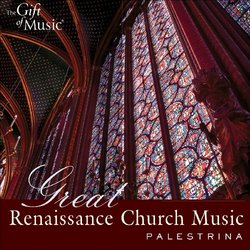| All Artists: Magdala Title: Great Renaissance Church Music Members Wishing: 0 Total Copies: 0 Label: The Gift of Music Original Release Date: 1/1/2006 Re-Release Date: 3/4/2005 Genre: Classical Style: Opera & Classical Vocal Number of Discs: 1 SwapaCD Credits: 1 UPC: 658592116427 |
Search - Magdala :: Great Renaissance Church Music
 | Magdala Great Renaissance Church Music Genre: Classical
Palestrina Sublime, magnificent church music by one of the greatest composers of the Renaissance. Often imitated, but never bettered, the calm grandeur of his motets for four, five, or even eight voices has inspired genera... more » |
Larger Image |
CD Details
Synopsis
Product Description
Palestrina Sublime, magnificent church music by one of the greatest composers of the Renaissance. Often imitated, but never bettered, the calm grandeur of his motets for four, five, or even eight voices has inspired generations of listeners, who have sought out his music's mellifluous perfection. Recorded by Magdala in sumptuous Oxford acoustics, this album is a sonic and musical delight. This is a recording of a series of motets by Palestrina, interspersed with some plainchant works. Palestrina's motets are considered to be amongst the most sublime examples of the Renaissance period, and indeed to be some of the most sublime music of any era. This is a recording of a series of motets by Palestrina, interspersed with some plainchant works. The 'motet' is a musical piece composed for voices around a text which is usually sacred in origin, and most often extracted from the words of scripture or from the words of the mass or offices of the church. A motet is a complex musical composition of the highest order, in which several 'voices' are intertwined in contrapuntal style. The individual musical lines and even, in subtle ways, the structure of a motet, is based on plainchant, a single line of music by which priests, monks or people could sing the important words of the church's liturgy. We present here, for example, two versions of 'Salve regina' and 'Alma redemptoris mater'. The first pieces are the original plainchant melodies, while the second pieces are Palestrina's re-working of melody and text into the larger-scale choral works, the motets. A similar compositional process can be heard in 'Ave maris stella' in which the verses of the text are heard 'in alternatim' between plainchant and a series of short motet-like movements. The composers of the vast corpus of plainchant have remained anonymous, although the music was famously gathered together, ordered and regularised by Pope Gregory around the end of the first millennium, and thus it is often referred to as 'Gregorian' chant. Palestrina, though, was far from anonymous. He was justly famous in his lifetime, and his works were those copied, studied and imitated most often by musicians and scholars for centuries after his death. Giovanni Pierluigi da Palestrina took his surname from the place of his birth, a small town not far from Rome. After singing as a boy chorister in the church of Santa Maria Maggiore in Rome, he worked for a while as 'maestro di capella' at the cathedral in Palestrina before returning to Rome, where he worked in both Saint Peter's and, for a time, as a member of the choir of the Sistine chapel. He rarely strayed far from the Papal court and remained a conservative figure both in music and politics. The church in the middle of the sixteenth century was going through major upheavals, and Palestrina's music got caught up in them. He has been credited with 'saving' church music, because his music was considered by the church authorities as being written in such a way as to allow the text to be heard and understood, at a time when much church music had become, in the opinion of many senior churchmen, overly florid and complex, and overly reliant on secular influence. Palestrina's motets are considered to be amongst the most sublime examples of the Renaissance period, and indeed to be some of the most sublime music of any era.

 Track Listings (13) - Disc #1
Track Listings (13) - Disc #1